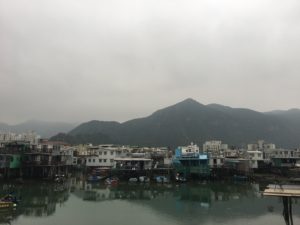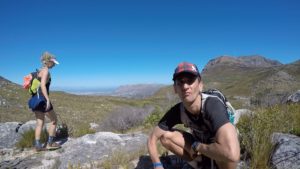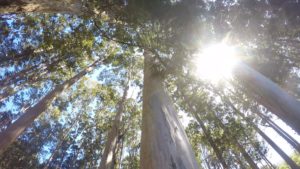
Tai-O ancient fishing village on Lantau Island, Hong Kong
When you’re like me and you return from your first lap around the world, you’re an authoritative expert on basically every problem in the book. You have all kinds of motivation to save Africa, clean the watershed, and bring peace to the Middle East. You are awesome and kinda smug. But, you can’t help that–you just went around the friggin’ planet, dude!
The big bummer though, is you actually suffer quite a bit of turbulence from re-entry, re-acclimating from zero-gravity into 9-to-5 adulthood. You’re not who you once were. You’ve been stretched. You’re walking on familiar streets, eating the same toast, but wearing someone else’s shoes that are too tight.

Mountain hopping in Cape Town, South Africa.
In this new relationship to your old baseline, you realize first and foremost, you don’t know shit about shit anymore. Your travels have shined a light into the depths of your ignorance. You’ve been stupefied and must humbly accept your newfound stupidity. Your earlier smugness dissipates. Isn’t going around the world the worst?!
Not at all actually. The good news is the happy accident of all superheros. What starts out tasting like radioactive toxic sludge is always the origin of your superpower mutations. Your 360 degrees of global perspective feels like a fluorescent-lit medical exam. At first it painfully illuminates your own zitty face and soul. Awkward! But then, that morphs into a kind of X-ray vision–your super-power to spot artifice, non-essentials, and flimsy questions. Here are a few examples of flimsy questions:
To Neil Armstrong: How was the moon, dude?
To Nelson Mandela: How was prison, dude?
To Henry David Thoreau: How was the pond, dude?
To Amelia Earhart: How was the sky, dudette?
To Jesus of Nazareth: Was the Passover celebration in Jerusalem so sick, dude?
To Me: How was your vacation, dude?
Now, don’t get me wrong, I LOVE coming home to questions and conversation. Even if the questions dance around the meat of it. So, what is the meat of it?

The prison cell where Nelson Mandela spent 18 of his 27 year jail term.
First of all – it wasn’t a vacation, dude. The Explore the Edges expedition challenged us on all the essential and elemental levels. It took us to the edge of our marriage, finances, endurance, friendships, sleeplessness, lost continents, sense of pride and shame, and even our spiritual convictions.
Some better, meatier questions might look like:
What the hell were you thinking?
What was worth risking so much for?
How have you fundamentally transformed inside?
What kind of secret treasures are you carrying around in your head?
Researcher/philosopher Jean Houston, when tasked to interview the astronauts as they come home from their lunar landing trip, was having trouble getting them to recall anything in the way of details about the moon. Finally, they said to her, “You’re asking the wrong questions. It wasn’t about what we saw ‘out there’; it’s about what happened in here.”
When I think of Henry David Thoreau spending two years, two months, and two days at the famous log cabin at Walden Pond, squatting on Ralph Waldo Emerson’s land, I imagine him walking around like a dumb-founded fool for a while in the aftermath. He was probably unemployable — grateful for the richness of his experience, but frustrated and puzzled about what to do with it.
I mean, what do you do with a Walden-shaped experience inside your brain? That gigantic pond sloshing around between his ears. Do you think Henry just moved onward and upward to the heights of nature poetry and motivational speaking? NO! He didn’t just metaphysically find himself at Walden. He found himself thoroughly confounded. He moved back into the grown-up house – indoors with Mr. and Mrs. Emerson, still pissed off about taxes, probably. From there, he began the monumental task to interiorize the experience.
How long did it take for Thoreau to inhabit the Walden Pond inside his mind? It’s not like 19th century Massachusetts had storage lockers for him to simply alphabetize the adventure into tidy containers of Instagrammable moments. Poetry didn’t just drip right out of his pen, immediately. Even with all that meditative time at the pond, and mentoring provided by Emerson, that’s NOT where he wrote his famous Walden nor his magnificent essay Civil Disobedience (that would come to inspire the likes of Nelson Mandela and Martin Luther King Jr.). It took years.

I can relate to the culture shock of moving between the highs and lows of these disparate interior and exterior worlds. (Patagonia is way better than spreadsheets.) It would be enough to unravel any man not grounded in nature and community. It took years of decompression and sifting to integrate Thoreau’s inner journey before it became shareable, before he could serenade us with his talk about backing life into a corner and sucking the marrow out of it. Walden became a real place. It was an even realer place– a habitation inside his mind, which was itself purer poetry than even the poems that followed.
I went to the woods because I wished to live deliberately, to front only the essential facts of life, and see if I could not learn what it had to teach, and not, when I came to die, discover that I had not lived. I did not wish to live what was not life, living is so dear; nor did I wish to practice resignation, unless it was quite necessary. I wanted to live deep and suck out all the marrow of life, to live so sturdily and Spartan-like as to put to rout all that was not life, to cut a broad swath and shave close, to drive life into a corner, and reduce it to its lowest terms, and, if it proved to be mean, why then to get the whole and genuine meanness of it, and publish its meanness to the world; or if it were sublime, to know it by experience, and be able to give a true account of it in my next excursion.
2 Comments
Ray Brook
Well said, and well done, dude! I once had a small statue of you on a bookcase wall in my office- It is often labeled “The Thinker”. It was also for me, asking these deeper questions of life while walking the Pacific Crest Trail, that led to climbing more summits and helping others seek the summit of a fulfilling life. Thanks to you two for sharing your life journey with us, going deep and going high.
Dwinelva
Beautiful, thought-provoking and inspiring. Thank you.